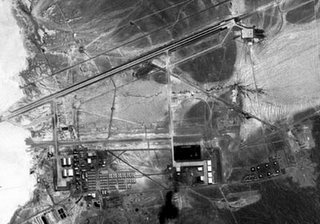
The Space Review posted this story detailing an incident in 1974 where astronauts on Skylab photographed Area 51 in Groom Lake, Nevada. This photograph of the facility, which I stole from the article header, was taken by the US Geological Survey in 1968.
The article makes a decent effort at trying to explain the conflict between a civilian agency following orders from a military agency. I felt like the author wanted to take a stab at conflict of loyalty, but I'm really not feeling it.
Like a lot of good little nerds, I had a stong interest in conspiracy theory when I was younger. JFK was probably the catalyst, though I didn't think aliens were putting something in McDonalds to make us more docile like RMS does. I understood even from a young age that many people have an alterior motive, so natually that made me wonder how much of each conspiracy theory I ran across might actually be true.
On the other hand, my short stint at The White House taught me some valuable lessons about importance of secrecy. I would have never known or considered why the schedules for POTUS and VPOTUS are only available on a need-to-know basis. The further in advance someone knows that the President is coming, the more time they have to prepare something dastardly. I find the concept ironic considering 10 years ago you could drive the 1600 block of Pennsylvania Avenue , and 30 years ago there was no fence or gate to keep you from driving up to the circle on either the East or West wing -- you just could. Over time, fear causes us to ever be more restrictive, never less.
The author, Dwayne Day, uses the onion analogy to discuss secrecy:
"Government officials have frequently argued over the need to refuse to confirm even the most basic knowledge about things that have been widely reported in the press for decades. For instance, the existence of the National Reconnaissance Office (NRO), which manages America’s spy satellite program, first became known in a 1971 New York Times article, but arguments flared up within intelligence circles for the next twenty years over whether or not to confirm its existence. Finally, in September 1992 the “fact of” the existence of the NRO was revealed in a terse press release that never even used the word “satellite.” Even after that decision, for several years the NRO refused to confirm that it actually conducted rocket launches, another glaringly obvious fact.
This refusal to admit the obvious was only surpassed by Groom Lake itself. The existence of an airstrip at Groom was first revealed when it was actually constructed. But it was not until 1999 that the U.S. Air Force issued a terse statement acknowledging that the facility did indeed exist, even though photos taken on the ground and overhead had been available for decades. In fact, at least two U.S. Geological Survey aerial photographs of Groom taken in 1959 and 1968 had been available in public archives, but not discovered until many years later.
To be fair, there is a logic to this secrecy policy of refusing to confirm the “fact of” an organization, or even an airbase in the Nevada desert. Intelligence officials often refer to secrecy being like an onion, and each layer that is peeled off reveals a little more of what is contained within. Even if the next layer is visible in vague form, the advocates of strong secrecy want to keep all the layers in place.
This policy is usually given solid form in legal discussions within government agencies. There the concern is not so much with foreign intelligence agencies, but with American citizens and the press, and their ability to request the declassification of government documents through the Freedom of Information Act. By refusing to even acknowledge the existence of something, government agencies have erected an outer legal barrier against requests for information from their own citizens."
The problem with the veil of secrecy, you don't know if the Great Oz is 11 feet tall or a record player that doesn't skip. Are you simply protecting our military's spy plane program (which is fine), or are you hiding something bigger?
The same fear that prompted our government to build a secret spy plane program in the middle of the desert and to insist that a civilian organization not take pictures of it, the same fear that makes Secret Service insist the President's schedule be kept under wraps while they closed off Pennsylvania Avenue, this is the same fear that conspiracy theorists have of our government.
One of the points that Michael Moore makes during Bowling for Columbine has to do with fear -- how people deal with it, and how people manipulate it. Even if you think he's a fat windbag who needs to shave, even if you've seen the movie and you don't agree with what he's saying, he makes a lot of very valid points about fear and poverty.
I wish sometimes that everyone would stop being afraid, even for just a moment. Fear is not a constructive emotion at all.
2 comments:
um, shouldn't it be "veil" of secrecy?
your friend, the jew-speller
shouldn't you sign it "cunt-jew-speller"?
Post a Comment